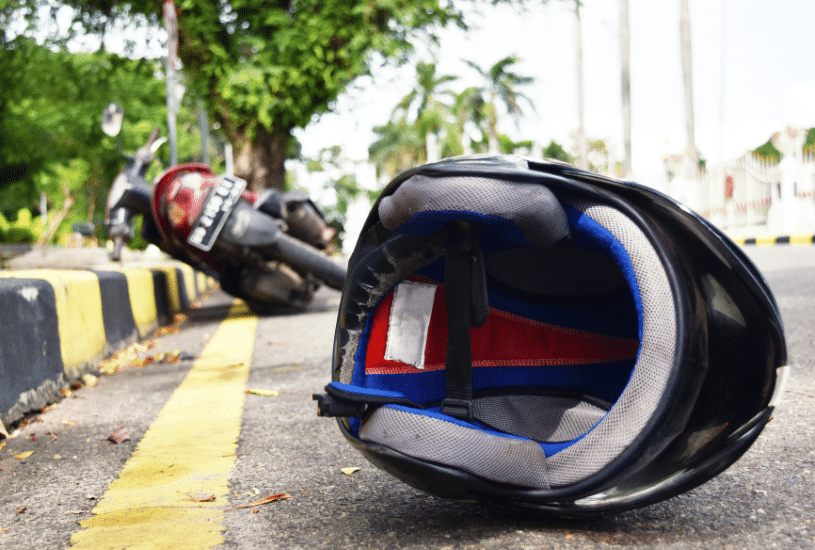Two-wheelers demonstrate more instability than most modes of personal transportation, leading to dramatic motorcycle accidents. Aside from helmets, riding gear, and the vehicle itself, protection remains sparse for motorcyclists. As a result, riders remain vulnerable to life-threatening injuries and possible loss of function.
Below, we highlight the most common motorcycle injuries.
Types of Injuries
Aside from the loss of life, motorcycle crashes can cause permanent damage to vital organs and other body parts. Riders may experience severe internal complications from the impact of the crash. Recent studies indicate that motorcyclists remain nearly 30 times more likely to suffer a fatal injury than car passengers.
Several factors influence the seriousness of motorcycle injuries, including:
● Speed
● Drift
● Age
● Weight of the motorcycle
● Size of the passenger vehicle
Lower Extremity Injuries
Some of the most common motorcycle injuries occur at or below the waist. During most crashes, motorcyclists suffer more damage to their lower extremities than their upper extremities. In grave situations, victims may suffer lifelong paralysis. Motorcyclists often report injuries to their:
● Pelvises
● Hips
● Knees
● Legs
● Ankles, feet, and toes
Most lower extremity injuries do not prove fatal. However, injured motorcyclists could suffer temporary or permanent walking disabilities, undergo amputation, or submit to several minor or major surgeries.
Upper Extremity Injuries
Injuries sustained to the upper body often lead to more severe complications than lower-body injuries. Most fatal motorcycle injuries result from upper-body damage, especially those involving significant damage to the head or chest. The body parts vulnerable to upper extremity injuries include:
● Face
● Head
● Neck
● Thorax
● Abdomen
Most Frequent Motorcycle Injuries
Some of the most frequent motorcycle injuries require no professional treatment at all. Examples include bumps, scrapes, contusions, and more. So, let’s look at the most commonly treated motorcycle injuries below.
Traumatic Brain Injury (TBI)
A traumatic brain injury (TBI) represents one of the most common, severe outcomes of motorcycle crashes. This type of injury results from a motorcyclist’s head hitting an object with significant momentum. Non-helmeted riders report more significant cases of TBI than their helmeted peers.
The National Highway Traffic Safety Administration (NHTSA) surveyed over 100,000 injured motorcyclists. Over 20% of non-helmeted riders sustained TBI, while the rate for helmeted motorcyclists stood at 15%.
Fractures
A motorcyclist may suffer from broken bones or dislocations after a crash, usually from falling off the two-wheeler or hitting a stationary object while skidding across the tarmac. Some of the most common fractures affect the:
● Rib cage
● Pelvic bone
● Hip
● Kneecap
● Femur, tibia, and fibula
● Ankles and toes
Spinal Cord Injury
A motorcyclist involved in a crash may experience paralysis from a spinal cord injury. Landing hard on the back or neck can damage the spine. Further, getting crushed by heavy objects impacts the delicate spinal cord causing a rider to end up as a paraplegic or quadriplegic.
Internal Damage
Beneath seemingly minor bruises, some motorcycle crash victims suffer lingering organ injuries. One risk involves internal bleeding, which can prove fatal in grave cases. The types of trauma that induce organ damage include blunt force, deceleration, and penetration.
At-risk organs include the kidneys, spleen, liver, pancreas, and stomach.
Victims may sustain:
● Pneumothorax or collapsed lungs
● Intracranial hemorrhages
● Tears in the aorta
● Reproductive organ damage
Road Rash
Rashes occur when a rider’s skin drags along the rough surface of the road upon landing. Victims may experience agonizing pain from their wounds. Vulnerable body parts include the face, limbs, and back.
Although road rashes are not fatal, severe cases require skin grafting. Dirt and debris may enter the skin where a first or second-degree road rash occurs. Third-degree road rashes cause deep wounds and excessive bleeding.
Common Causes of Motorcycle Accidents
The most common cause for motorcycle accidents includes the failure of passenger car drivers to notice passing motorcycles.
Head-on collisions with other vehicles result in 56% of motorcycle accident deaths. Motorcycle riders face a higher risk of fatal injuries than car drivers. Discover some of the most frequent causes of motorcycle accidents below.
Reckless Driving
Speeding and driving under the influence of alcohol or drugs put riders and other vehicles at risk of head-on collisions. Further, aggressive riding and distracted riding prove dangerous for riders.
Road Conditions
Hazardous road conditions and unexpected weather events pose a high risk for motorcyclists. While cars can dodge some accidents, motorcyclists sometimes experience devastating outcomes. Slippery, uneven surfaces, loose gravel, or debris on the road may cause fatal crashes.
Lane Changes
Accidents happen when motorcyclists merge or ride between lanes. Such lane-splitting results in frequent collisions because passing cars do not expect two-wheelers in their lanes. Driving between two lanes usually occurs during traffic jams.
Risky Left Turns
Passenger vehicles making left-hand turns are responsible for 42% of all road accidents involving motorcycles. Drivers often overlook motorcycles while turning left, causing collisions.
Tight Turns
One challenge associated with riding motorcycles involves the execution of sharp corner turns. The risks associated with hitting road debris increase during tight turns.
Defective Equipment
Faulty components account for many motorcycle mishaps, causing riders to lose control of their malfunctioning bikes. Riders can spot defects in their motorcycles’:
● Tires
● Brakes
● Fuel systems
● Designs
Law Tigers | Motorcycle Accident Attorney Referrals
Accidents can involve riders, pedestrians, and vehicle passengers. At Law Tigers, our dedicated motorcycle accident attorneys advocate for the welfare of injured motorcyclists and passengers. Schedule a free consultation with our team by calling 1-800-529-8443.



